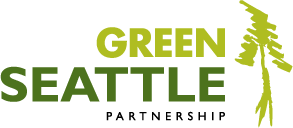How to Report Camping
Illegal camping is one symptom of the large, complex problem of homelessness citywide and nationwide. Seattle Parks and Recreation is working together with Seattle Police, Seattle Human Services, Seattle Office of Housing, the City Attorney, and community partners on a shared, broad response to try to address the multifaceted problem.
Illegal camping in parks presents hazards to people (including the campers themselves) as well as to property. We frequently encounter illegal camping while we carry out restoration activities in natural areas, and we strive to address it compassionately as well as safely.
To ensure a consistent, coordinated, and humane response to campers throughout the city, in April 2008 the City of Seattle issued rules and guidelines for all property-owning departments: administrative rules and an Executive Order on unauthorized encampments.
First and foremost, if you see a crime in progress in your park, call 911.
To report camping at your park:
- Contact the Customer Service Bureau (CSB) by telephone at 206-684-CITY (2489). If the encampment is obstructing a sidewalk or park feature, please specifically mention the obstruction. Also, you can report camps using the City’s Find It, Fix It Service Request Mobile App http://www.seattle.gov/customer-service-bureau/find-it-fix-it-mobile-app. The app has a drop down menu for reporting, which does not include encampments, and you will need to select “other” and write in “Encampment.”
- Send an email to your Plant Ecologist detailed information about what you reported (e.g.) the number of camps and people present, location – a simple map and/or photo will help identify the area – potential hazards, and any other relevant information).
More Information to Consider
Recreational activities in natural areas tend to discourage illegal activities. There are a number of ways you can help.
- Report camping on other City property: Contact the Customer Service Bureau (CSB) via webform at seattle.gov/customerservice/ or telephone at 206-684-CITY (2489). For other neighborhood concerns, please refer to the Pocket Guide of Helpful Phone Numbers in Seattle.
- Be mindful of personal safety: Work in teams as much as possible. Always wear Seattle Parks-supplied orange safety vests while working in a park. Always carry a safety whistle and cellphone. Know your exact location and pay attention to your immediate surroundings.
- Report discarded needles, syringes and other SHARPS: Monday-Friday, 7 a.m.-3:30 p.m., contact the Parks Maintenance Request Line at 206-684-7250. After hours and on weekends, contact the Park Duty Officer Pager, 206-982-4583. Report anytime with the Find it, Fix App on your smartphone. More information available at: http://www.seattle.gov/customer-service-bureau/hazardous-materials-reporting
- Get to know your area’s Community Police Officers. Seattle Parks’ Security Officer can help you communicate with Seattle Police—ask your Plant Ecologist to put you in touch with the Parks Security Officer. (Crime data information for your neighborhood is available from Seattle Police.)
- Factor in principles of Crime Prevention Through Environmental Design (CPTED) in the restoration process:
- Natural Surveillance: Keep some vegetation low or maintained in troublesome areas so that people can be easily seen by other users, staff, and anyone who may pass by the park. Keep this in mind when making plant selections and maintaining official trail corridors.
- Natural Access: Vegetation, temporary fencing, and woody debris as well as a formal access/trail can direct park users on the best way to enter and exit areas.
- Territoriality: Territorial reinforcement refers to ways in which we make it evident that an area is public parkland, and that it is actively used and stewarded. Legitimate activities discourage illegal activities.
- Maintenance: Plan to maintain areas that we enroll into active restoration. An area that shows no signs of stewardship and maintenance can attract unwanted activities.
More Information About Reporting
When you report camping, that information is entered in a citywide encampment response system that enables follow-up from the agency that owns the land, from Seattle Police, and from the Human Services Department, which contracts with a nonprofit agency to provide campers with information about the various resources available to them. In response to a report of camping on parkland, maintenance staff inspect the site, then post the camp for removal and cleanup. The timing for removal depends on the site’s location (access, terrain, etc.) and availability of support from other agencies.
“Unauthorized camping” means a tent or other shelter erected, or camping equipment and personal property assembled on public and private property that, to a reasonable person, indicates that a person has remained or intends to remain on the property overnight without proper permits or when the property is not open to the public. Camping equipment includes, but is not limited to tarps, blankets, sleeping bags, cooking equipment, and other items commonly associated with remaining overnight.
